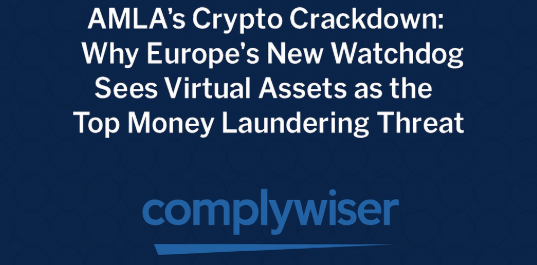AMLA’s Crypto Crackdown: Why Europe’s New Watchdog Sees Virtual Assets as the Top Money Laundering Threat

The European Union’s financial landscape is undergoing a historic transformation with the creation of the Anti-Money Laundering Authority (AMLA). Headquartered in Frankfurt, AMLA will coordinate supervision across all 27 EU member states and directly oversee the riskiest financial institutions.
Unsurprisingly, in its first assessments AMLA has placed crypto and virtual assets at the very top of its money laundering threat list. For businesses in fintech, payments, and digital assets, this is both a warning and an opportunity.
Why Crypto Tops the AMLA Risk List
While virtual assets represent only a fraction of global financial flows, they are disproportionately exploited by criminals. AMLA has highlighted several reasons why:
- Anonymity and Pseudonymity – Unlike traditional banking, many crypto transactions lack clear identifiers of the sender and receiver.
- Cross-border Speed – Transfers are near-instant and global, bypassing traditional financial controls.
- Complex Ecosystem – From exchanges to mixers, DeFi platforms, and NFTs, the sector creates multiple layers where illicit funds can hide.
- Fragmented Oversight – Different national rules across Europe have left gaps for regulatory arbitrage.
For regulators, this means that crypto is no longer a niche risk - it’s a mainstream compliance challenge.
What This Means for Financial Institutions and CASPs
If you’re a Crypto-Asset Service Provider (CASP) or a financial institution interacting with virtual assets, AMLA’s stance means tougher expectations are coming.
Key implications include:
- Unified EU Supervision – No more "light-touch" jurisdictions. Standards will be harmonised across all member states.
- Direct AMLA Oversight – The riskiest CASPs will be supervised directly by AMLA, not just by local regulators.
- Higher Compliance Costs – Expect stricter KYC procedures, enhanced transaction monitoring, and more reporting obligations.
- Zero-Tolerance for Gaps – AMLA has already signalled that failing to meet requirements in one member state will no longer be tolerated.
Preparing Your Business: Steps to Take Now
At ComplyWiser, we advise clients to start preparing early. Even if the full AMLA framework is still being rolled out, proactive measures will protect your business and demonstrate credibility to partners, banks, and investors.
- Review AML/KYC Policies – Ensure they meet MiCA and 6AMLD standards.
- Enhance Transaction Monitoring – Implement blockchain analytics tools to detect suspicious activity.
- Train Your Team – Compliance awareness should be company-wide, not limited to the compliance officer.
- Document Everything – Regulators will demand clear audit trails; proper documentation is key.
- Engage Experts – Partner with specialists who understand both crypto regulation and traditional compliance.
Why Early Action Matters
Regulation is often seen as a burden, but AMLA’s creation is also an opportunity. Companies that act early will stand out as trusted, credible players, winning the confidence of banks, investors, and customers.
With crypto under the microscope, compliance is not just about avoiding fines - it’s about securing your position in a maturing, more regulated European market.
Final Thoughts
AMLA’s decision to put crypto at the top of its money laundering risk list sends a clear message: virtual assets can no longer operate on the regulatory fringes.
For businesses, this is the time to invest in compliance, strengthen internal controls, and prepare for direct EU-level supervision. Those who embrace these changes will not only survive but thrive in Europe’s new financial era.
Related articles

Meeting AML Standards in the UAE: What to Expect in 2025
In 2025, the UAE is enforcing one of its toughest AML/CFT regimes yet, with multi-agency oversight, AI-driven monitoring, and steep penalties reaching AED 50 million. Financial institutions, DNFBPs, and VASPs must strengthen KYC, UBO transparency, and risk-based frameworks to stay compliant and protect operations in this zero-tolerance environment.
Read more
Top Money Laundering Scams: A Growing Global Concern
Money laundering remains a significant global challenge, with criminals continually evolving their tactics to exploit financial systems. This article delves into some of the most impactful money laundering scandals, including the Panama Papers, the Russian Laundromat, the Danske Bank scandal, 1MDB, and Wirecard. These cases reveal the sophisticated methods used to disguise illicit funds and highlight the importance of robust regulatory frameworks and international cooperation. At ComplyWiser, we provide expert guidance to help businesses ensure compliance and protect against these threats.
Read more
Avoiding “Fake Work” in Compliance: Build Real, Impactful Strategies
Many businesses fall into the trap of "fake work" when it comes to compliance. They’re ticking boxes and thinking they’re making progress, but in reality, they’re not truly compliant.
Read more